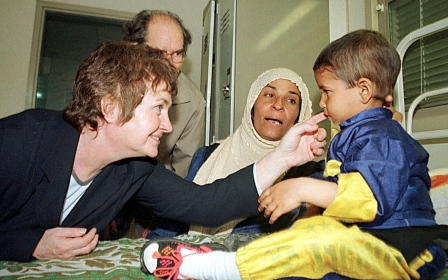Iraqi media ignore Chilcot, focus on ongoing violence

While British media reflect on the Iraq War with the publication of the long-awaited Chilcot report, Iraqi media are busy concentrating on the daily chaos the war has left in its wake.
Four issues are dominating Iraqi media this morning: the ever increasing death toll of the Karrada bombing, popular anger at the government, regional responses to the suicide attack on the Prophet’s Mosque in Medina, and of course Eid-ul-Fitr celebrations across the Arab and Islamic world.
Like much of the Arab world, satellite television is the main source of news for many Iraqis.
Al-Jazeera and Al-Arabiya, the region’s two most popular satellite TV networks, are quiet on Chilcot. The former is focusing its coverage on Eid celebrations across the world, and the latter with updates from the wars in Yemen and Syria, and the bombings in Karrada and the Prophet’s Mosque.
None of the top 10 stories on the state-run Iraqi Media Network are concerned with Chilcot. The TV networks are reporting on: anti-government protests fuelled by the Karrada bombing, Iraqi Prime Minister Haidar al-Abadi’s decision to execute prisoners from the Islamic State group and general news from the international coalition’s efforts against IS.
Al-Sharqiya News, aligned with Iraq’s Sunni community who have been sidelined from politics since the toppling of Saddam Hussein, is also quiet on Chilcot. The political fallout from the Karrada bombing is dominating the channel, as is coverage of the war against IS.
The Basra-based al-Fayhaa Satellite Channel, which aligns itself more with Iraq’s Shia community, is focusing on the government response to the Karrada bombing, the government’s decision to execute IS prisoners, a car bomb attack in al-Sadr city (a suburb of Baghdad), and finally comments from the Sadrist movement on the events shaking the country.
After repeated protests held in Baghdad and other parts of the country over political corruption, thousands of supporters of Shia cleric Muqtada al-Sadr broke into the capital's Green Zone in May as frustration over both nepotism and political deadlock exploded.
Pan-Arab daily newspaper al-Araby al-Jadeed is leading with renewed Iraqi protests near the entrance to the Green Zone in response to the Karrada bombing.
None of the popular website’s leading articles are concerned with Chilcot either.
Eid-ul-Fitr celebrations are dominating its coverage this morning, as well as the continued Israeli blockade of Hebron villages and updates from the wars in Syria and Yemen.
The Huffington Post’s Arabic language website, which is popular on social media, is leading its coverage entirely with Eid-ul-Fitr celebrations across the Arab and Islamic worlds.
The Arabi 21 online news website, also popular on Arab social media, is leading with Syrian President Bashar al-Assad’s decision to hold public Eid prayers in Homs, a former rebel stronghold. Other Eid news, as well as reaction to the Karrada and Prophet’s Mosque bombings in Saudi Arabia, complete the website’s top coverage.
Only BBC Arabic, for obvious reasons, is following the story with any sense of urgency, or even interest.
If the aim of the Chilcot inquiry was to achieve a sense of closure, its effects, like its reporting, will be limited to the West. In Iraq, it’s a day like any other.
Stay informed with MEE's newsletters
Sign up to get the latest alerts, insights and analysis, starting with Turkey Unpacked
Middle East Eye delivers independent and unrivalled coverage and analysis of the Middle East, North Africa and beyond. To learn more about republishing this content and the associated fees, please fill out this form. More about MEE can be found here.




